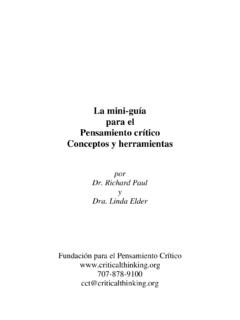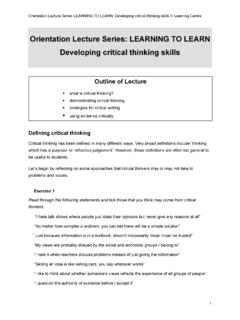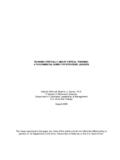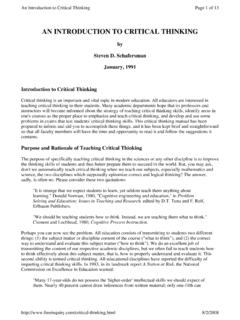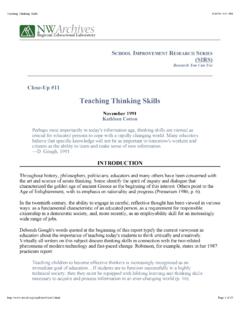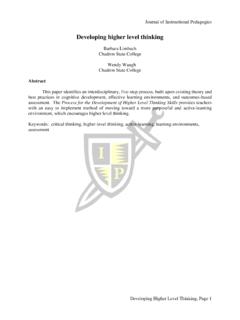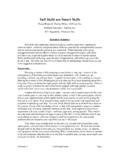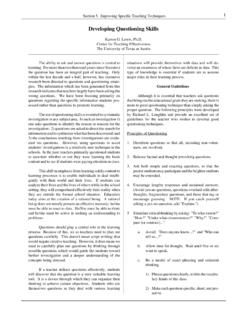Transcription of Linda Elder - Critical thinking
1 Linda Elder biographical information Dr. Linda Elder is an educational psychologist and a prominent authority on Critical thinking . She is President of the Foundation for Critical thinking and Executive Director of the Center for Critical thinking . Elder has taught psychology and Critical thinking at the college level and has given presentations to more than 20,000 educators at all levels. She has co-authored four books along with Richard Paul, including Critical thinking : Tools for Taking Charge of Your Learning and Your Life, Critical thinking : Tools for Taking Charge of Your Professional and Personal Life and Twenty-Five Days to Better thinking and Better Living.
2 She has co-authored twenty thinker s guides on Critical thinking and co-authors a quarterly column on Critical thinking in the Journal of Developmental Education. Elder came to the Center and Foundation for Critical thinking in 1994 after completing a doctorate in educational psychology from the University of Memphis. Her interest in Critical thinking stems from her concern that most of the problems in human life are caused by problems in human thinking . Her primary concern is to contribute to a world that is more just, more fair, more humane, not just for the billions of people living on the planet but for other sentient creatures as well.
3 Elder began her professional career in 1983 at Youth Services, a non-profit organization concerned with helping troubled youth in Memphis avoid prison or juvenile detention. Through Youth Services she also taught independent living skills to low-income young adults. She then moved to Southwest Tennessee Community College to head up a program for displaced homemakers, which fostered skills of economic survival. Elder completed an MA degree in Psychology (1988) and the doctorate in 1990. After completing the doctorate, Elder began teaching psychology at the college level.
4 It was at this time that she was introduced to Critical thinking and began its study in order primarily to reach her students at a deeper level. Elder is now considered a leading authority on Critical thinking internationally. One conceptualization of Critical thinking written by Elder can be found on the Foundation for Critical thinking websitei as follows: Critical thinking is self-guided, self-disciplined thinking which attempts to reason at the highest level of quality in a fair-minded way. People who think critically consistently attempt to live rationally, reasonably, empathically.
5 They are keenly aware of the inherently flawed nature of human thinking when left unchecked. They strive to diminish the power of their egocentric and sociocentric tendencies. They use the intellectual tools that Critical thinking offers concepts and principles that enable them to analyze, assess, and improve thinking . They work diligently to develop the intellectual virtues of intellectual integrity, intellectual humility, intellectual civility, intellectual empathy, intellectual sense of justice and confidence in reason.
6 They realize that no matter how skilled they are as thinkers, they can always improve their reasoning abilities and they will at times fall prey to mistakes in reasoning, human irrationality, prejudices, biases, distortions, uncritically accepted social rules and taboos, self-interest, and vested interest. They strive to improve the world in whatever ways they can and contribute to a more rational, civilized society. At the same time, they recognize the complexities often inherent in doing so. They avoid thinking simplistically about complicated issues and strive to appropriately consider the rights and needs of relevant others.
7 They recognize the complexities in developing as thinkers, and commit themselves to life-long practice toward self-improvement. They embody the Socratic principle: The unexamined life is not worth living, because they realize that many unexamined lives together result in an uncritical, unjust, dangerous world. Linda Elder has focused in her work primarily on the relationship between cognition and affect and is most interested in the barriers to the development of Critical thinking , namely egocentric and sociocentric thinking .
8 The Stages of Critical thinking Development Elder has developed an original stage theory of Critical thinking development which is briefly details as followsii: Stage One: The Unreflective Thinker Stage Two: The Challenged Thinker Stage Three: The Beginning Thinker Stage Four: The Practicing Thinker Stage Five: The Advanced Thinker Stage Six: The Accomplished Thinker Stage One: The Unreflective Thinker Defining Feature: Unreflective thinkers are largely unaware of the determining role that thinking is playing in their lives and of the many ways that problems in thinking are causing problems in their lives.
9 Unreflective thinkers lack the ability to explicitly assess their thinking and improve it thereby. Knowledge of thinking : Unreflective thinkers lack the knowledge that high quality thinking requires regular practice in taking thinking apart, accurately assessing it, and actively improving it. In fact, unreflective thinkers are largely unaware of thinking as such, hence fail to recognize thinking as involving concepts, assumptions, inferences, implications, points of view, etc. Unreflective thinkers are largely unaware of the appropriate standards for the assessment of thinking : clarity, accuracy, precision, relevance, logicalness, etc.
10 Skill in thinking : Unreflective thinkers may have developed a variety of skills in thinking without being aware of them. However, these skills are inconsistently applied because of the lack of self-monitoring of thought. Prejudices and misconceptions often undermine the quality of thought of the unreflective thinker. Stage Two: The Challenged Thinker Defining Features: Thinkers move to the challenged stage when they become initially aware of the determining role that thinking is playing in their lives, and of the fact that problems in their thinking are causing them serious and significant problems.

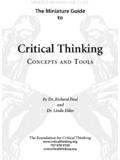
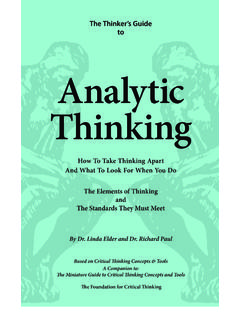
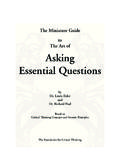
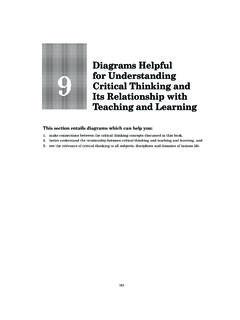
![riChard Paul [ ] - Critical thinking](/cache/preview/4/4/e/4/c/a/a/a/thumb-44e4caaa8aace41cbe216a7e608396cc.jpg)



